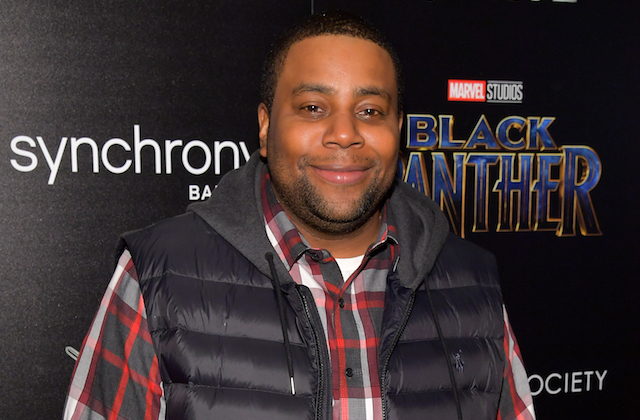Flip the channel to NBC on any given Saturday night during the fall, winter or spring and you’ll probably see Kenan Thompson doing something hilarious. The actor’s penchant for outlandish characters and spot-on impersonations of celebrities like LaVar Ball and Steve Harvey are a hallmark of his 15-season run on "Saturday Night Live" ("SNL")—the longest of any performer on a show with notable diversity issues.
After receiving his first Emmy nomination this year, the comic actor explores his career and "SNL’s" slow work in adding Black representation in a profile that The New York Times published today (August 15). The article features Thompson’s reflections on his sketch comedy career, which began with popular turns on Nickelodeon shows "All That" and "Kenan and Kel." "SNL" came calling in 2003 after the departure of Tracy Morgan:
rnt
He was hired that year alongside Finesse Mitchell and J.B. Smoove (who both left the show in 2006). As Mr. Thompson said with a laugh, “Once Tracy left, they felt like it was Black audition time, I guess.”
t
Little by little, Mr. Thompson made a name for himself. The recurring roles he cited as personal breakthroughs included a hardened prison inmate in a Scared Straight program and the host of a perplexing BET talk show called “What Up With That?”
As one of the show’s few Black performers, Thompson once courted controversy by suggesting the program couldn’t find any qualified Black actresses. Sasheer Zamata and Leslie Jones were hired following critiques of Thompson and the show. While he did not directly address those remarks in today’s profile (he previously broached them in a 2016 story for The New Yorker), he did discuss the impact of increased public attention on television diversity:
rnt
Today, Mr. Thompson said he had benefited from a social shift, at “SNL” and in the world beyond it, as more Black people attain positions of cultural prominence.
t
That dynamic had brought more Black hosts to the show, resulting in more appearances for Mr. Thompson. ([Co-head writer Bryan Tucker] pointed out that, just this past season, “SNL” had featured seven Black guest hosts—other years may have as few as two or three—which “usually does mean a better week for Kenan,” he said, even if it just meant playing “the brother or the dad” in a given sketch.)
t
Mr. Thompson explained that this broadened sensibility at the show meant more writers were attuned to the people he already pays attention to, the characters he wants to play and the statements he wants to make—all leading to better opportunities for him.
t
“It’s a progressive thing,” he said. “Back in the day, the things that they were mimicking and everybody was familiar with, was a little more one-sided. Because it was just a more one-sided world. But now the world is so open, especially New York—of course the show had to progress and be able to reflect that.”
SNL co-head writer Bryan Tucker exemplified this change with a recent sketch where Donald Glover (who, like Thompson, was raised in the Atlanta area) parodied trap rap group Migos:
rnt
He also pointed to a recent segment where Mr. Thompson, his co-star Chris Redd and the guest host Donald Glover played a quarreling hip-hop trio modeled on Migos, an Atlanta group that performed on the show a few weeks earlier.
t
“Those kinds of sketches would have been harder to have on the show five years ago,” Mr. Tucker said, “where now the culture is changing and our writing staff is a little younger and hipper, and will put out those ideas and there’s an open door for them.”
Learn more about Thompson’s journey at NYTimes.com.
